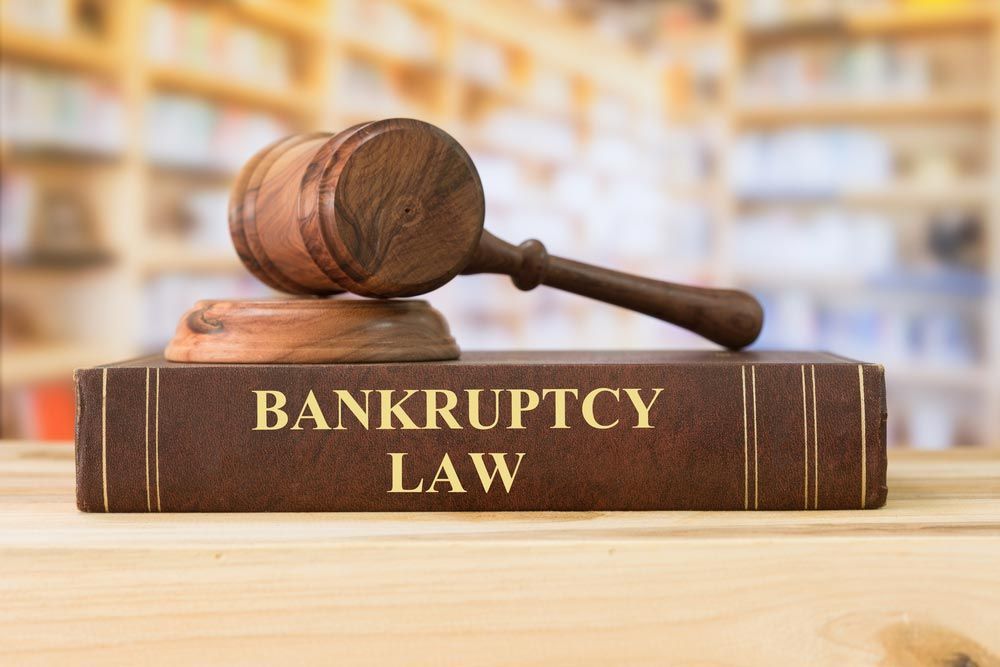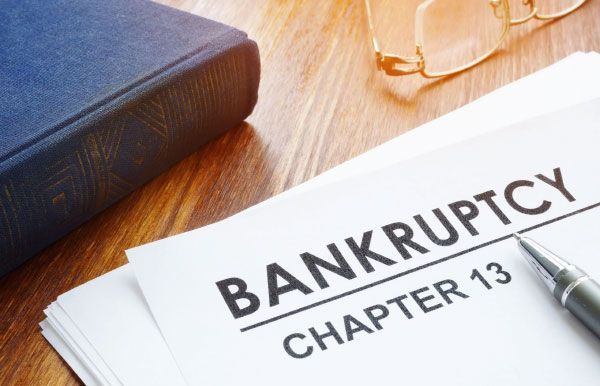09 Jun, 2023
Financial difficulties can be overwhelming, leaving individuals burdened by unmanageable debts and uncertain futures. In such challenging times, Chapter 13 bankruptcy offers a lifeline to those seeking to regain control over their financial well-being. This legal process provides individuals with the opportunity to reorganize their debts and establish a structured repayment plan, offering a path towards a more stable and secure future. In this comprehensive introduction to Chapter 13 bankruptcy, we will delve into its purpose, benefits, and the crucial role of a knowledgeable and experienced Chapter 13 bankruptcy lawyer in guiding individuals through the process. Understanding Chapter 13 Bankruptcy: Chapter 13 bankruptcy, often referred to as a "wage earner's plan," is a form of bankruptcy under the United States Bankruptcy Code. Unlike Chapter 7 bankruptcy, which involves liquidating assets to discharge debts, Chapter 13 bankruptcy focuses on creating a feasible repayment plan that allows individuals to retain their assets while gradually paying off their debts over a specified period. The Purpose and Benefits of Chapter 13 Bankruptcy: The primary purpose of Chapter 13 bankruptcy is to provide individuals with a structured framework to reorganize their debts and regain financial stability. By developing a manageable repayment plan, individuals can address their outstanding debts while maintaining control over their assets and avoiding the liquidation process. One of the significant advantages of Chapter 13 bankruptcy is the ability to halt foreclosure proceedings and protect one's home from being seized by creditors. Through the automatic stay provision, which takes effect as soon as the bankruptcy petition is filed, individuals are shielded from collection actions, including foreclosure, providing a much-needed breathing space to develop a plan to catch up on mortgage arrears. Chapter 13 bankruptcy also offers the opportunity to address other forms of debt, including credit card bills, medical expenses, personal loans, and more. Through a repayment plan spanning three to five years, individuals can consolidate their debts and make manageable monthly payments, often at reduced interest rates. Furthermore, Chapter 13 bankruptcy provides an alternative to the potential loss of valuable assets. Individuals can retain their cars, homes, and other property while repaying creditors according to the approved plan. This feature is particularly advantageous for those with significant equity in their assets or who face the risk of losing essential possessions in Chapter 7 bankruptcy. The Role of a Knowledgeable and Experienced Chapter 13 Bankruptcy Lawyer: Navigating the complexities of Chapter 13 bankruptcy requires expertise and understanding of the legal system. An experienced Chapter 13 bankruptcy lawyer plays a pivotal role in guiding individuals through the process, ensuring their rights are protected and that they receive the full benefits available to them. A skilled attorney will begin by conducting a thorough analysis of an individual's financial situation, evaluating their debts, income, expenses, and assets. This assessment allows the lawyer to develop a comprehensive repayment plan that is both feasible for the debtor and acceptable to the court. Throughout the Chapter 13 bankruptcy process, a knowledgeable lawyer will handle all legal proceedings, including the preparation and filing of necessary documents, negotiations with creditors, and representation at court hearings. Their guidance ensures compliance with all legal requirements, facilitates effective communication with creditors, and maximizes the chances of a successful outcome. Moreover, a Chapter 13 bankruptcy lawyer provides invaluable support by offering personalized advice and counsel tailored to the unique circumstances of each client. They can help individuals understand the implications of the process, answer questions, address concerns, and provide ongoing guidance during the repayment period. When you consult with a Chapter 13 bankruptcy lawyer, they will conduct a thorough evaluation of your financial circumstances. They will review your debts, income, expenses, and assets to determine if Chapter 13 bankruptcy is a suitable option for you. They will also assess the feasibility of a repayment plan, ensuring it aligns with your income and financial capabilities. A knowledgeable attorney will guide you through the necessary documentation and paperwork required for filing a Chapter 13 bankruptcy petition. They will assist in the preparation of a comprehensive repayment plan that meets legal requirements and satisfies the court. By leveraging their expertise, they can help you present a strong case and increase your chances of a successful outcome. A Chapter 13 bankruptcy lawyer will advocate for your interests and protect your rights throughout the bankruptcy process. They will communicate with creditors on your behalf, negotiate terms, and represent you in court hearings. Their presence ensures that your rights are upheld, and the entire process is handled smoothly and efficiently. Qualifying for Chapter 13 Bankruptcy: Chapter 13 bankruptcy offers individuals an opportunity to restructure their debts and embark on a journey towards financial stability. However, not everyone is eligible for this form of bankruptcy. In this section, we will explore the key factors that determine eligibility for Chapter 13 bankruptcy, including debt limits, regular income, and the importance of a steady repayment plan. It is crucial to consult with a skilled Chapter 13 bankruptcy lawyer to assess your financial situation and determine your eligibility for this beneficial debt relief option. Debt Limits: One of the primary considerations for qualifying for Chapter 13 bankruptcy is meeting certain debt limits. As of the latest guidelines, as of September 2021, unsecured debts (such as credit card bills and medical bills) must be less than $419,275, while secured debts (such as mortgages and car loans) must be less than $1,257,850. These limits are subject to change and should be verified with the current guidelines. Regular Income: Having a regular source of income is another crucial factor in determining eligibility for Chapter 13 bankruptcy. This requirement ensures that individuals have the means to meet their repayment obligations under the proposed plan. Whether you have a steady job, self-employment income, or regular retirement benefits, demonstrating a consistent income stream is vital to qualify for Chapter 13 bankruptcy. Steady Repayment Plan: A fundamental aspect of Chapter 13 bankruptcy is the creation of a feasible repayment plan. This plan outlines how you will pay off your debts over a specified period, typically three to five years. It considers factors such as your income, living expenses, and the amount of debt you owe. The repayment plan must be realistic, ensuring that you can make consistent monthly payments to creditors. Qualifying for Chapter 13 bankruptcy involves meeting specific criteria related to debt limits, regular income, and a feasible repayment plan. Consulting with a skilled Chapter 13 bankruptcy lawyer is crucial to evaluate your financial situation, assess your eligibility, and guide you through the complex legal proceedings. By seeking professional guidance, you can navigate the qualification process with confidence, increasing your chances of successfully reorganizing your debts and achieving long-term financial stability. The Chapter 13 Bankruptcy Process: Filing for Chapter 13 bankruptcy can be a transformative step towards regaining financial stability. In this section, we will delve into the step-by-step process of Chapter 13 bankruptcy, guiding you through the crucial stages involved. From preparing the repayment plan to obtaining court approval, we'll cover the essential aspects of the process. Additionally, we will emphasize the invaluable role of a Chapter 13 bankruptcy lawyer in guiding individuals through each stage and ensuring compliance with legal requirements. 1. Consultation with a Chapter 13 Bankruptcy Lawyer: Before initiating the Chapter 13 bankruptcy process, it is advisable to seek the guidance of a skilled Chapter 13 bankruptcy lawyer. During an initial consultation, they will assess your financial situation, analyze your debts, income, and expenses, and determine if Chapter 13 bankruptcy is the appropriate solution for your circumstances. Their expertise will provide insights into the feasibility of a repayment plan and the overall process. 2. Preparing the Repayment Plan: One of the critical elements of Chapter 13 bankruptcy is the development of a repayment plan. Working closely with your Chapter 13 bankruptcy lawyer, you will craft a plan that outlines how you intend to repay your debts over a specific period, typically three to five years. The plan takes into account your income, necessary living expenses, and the amount of debt owed to each creditor. 3. Filing the Bankruptcy Petition and Required Documentation: Once the repayment plan is prepared, your Chapter 13 bankruptcy lawyer will assist you in filing the bankruptcy petition with the appropriate bankruptcy court. Along with the petition, you will need to provide essential documentation, such as a schedule of assets and liabilities, a list of current income and expenditures, a list of creditors and their claims, and a statement of financial affairs. Accurate and complete documentation is crucial for a successful filing. 4. Automatic Stay and Repayment Plan Approval: Upon filing the bankruptcy petition, the automatic stay provision comes into effect, offering immediate relief from creditor actions, including foreclosure, wage garnishment, and collection calls. While the automatic stay provides temporary protection, the repayment plan must be approved by the court to establish a long-term solution. Your Chapter 13 bankruptcy lawyer will present the repayment plan to the court, ensuring its compliance with legal requirements and its feasibility for you. 5. Meeting of Creditors: After filing the bankruptcy petition, you will be required to attend a meeting of creditors, also known as the 341 meeting. During this meeting, you, your attorney, and the court-appointed bankruptcy trustee will discuss the details of your case. Creditors may attend and have the opportunity to ask questions about the repayment plan and other relevant matters. Your Chapter 13 bankruptcy lawyer will guide you through this meeting and help address any concerns that may arise. 6. Confirmation Hearing and Court Approval: Following the meeting of creditors, a confirmation hearing will be scheduled. At this hearing, the bankruptcy court will review your repayment plan and consider any objections raised by creditors or the trustee. If the court finds the plan to be fair, reasonable, and feasible, it will issue an order confirming the plan, and you will proceed with making scheduled payments according to the approved plan. Throughout the entire Chapter 13 bankruptcy process, your Chapter 13 bankruptcy lawyer will provide crucial support and guidance. They will ensure that all required documentation is submitted accurately and on time, represent you in court proceedings, and handle negotiations with creditors. Their expertise and knowledge of the legal intricacies of the process will help ensure compliance with all legal requirements and maximize the potential for a successful outcome. The Chapter 13 bankruptcy process involves several essential stages, from preparing the repayment plan to obtaining court approval. Seeking the guidance of a knowledgeable Chapter 13 bankruptcy lawyer is crucial to navigate this complex process successfully. Their expertise will help you develop a feasible repayment plan, submit the necessary documentation, and represent your interests throughout the proceedings. By understanding the process and having the support of a skilled attorney, you can embark on a path towards debt relief and financial stability. Benefits and Considerations of Chapter 13 Bankruptcy: Regain Control and Embrace Financial Freedom Chapter 13 bankruptcy offers individuals a lifeline when facing overwhelming debts and uncertain financial futures. In this closing section, we will explore the significant benefits and considerations associated with Chapter 13 bankruptcy. From saving homes from foreclosure to gaining control over debt repayment, this debt relief option provides individuals with a fresh start. However, it is crucial to weigh the considerations, such as the commitment to the repayment plan and the impact on credit. Consulting a knowledgeable Chapter 13 bankruptcy lawyer is essential to understand how these factors apply to your unique circumstances. Benefits of Chapter 13 Bankruptcy: Save Your Home from Foreclosure: One of the most significant advantages of Chapter 13 bankruptcy is its ability to halt foreclosure proceedings. By filing for bankruptcy, you can invoke the automatic stay provision, which provides immediate relief from creditor actions. This provision temporarily stops foreclosure, giving you the opportunity to catch up on missed mortgage payments and save your home. Stop Creditor Harassment: Constant calls and harassment from creditors can take a toll on your emotional well-being. Chapter 13 bankruptcy puts an end to creditor harassment by invoking the automatic stay. This provision prohibits creditors from contacting you or pursuing collection actions, providing you with much-needed peace of mind. Gain Control Over Debt Repayment: Chapter 13 bankruptcy allows you to regain control over your financial situation. Through a structured repayment plan, you can consolidate and manage your debts effectively. With the assistance of a Chapter 13 bankruptcy lawyer, you can develop a realistic plan tailored to your income and expenses. This enables you to make affordable monthly payments and work towards becoming debt-free. Retain Valuable Assets: Unlike Chapter 7 bankruptcy, which may involve liquidating assets, Chapter 13 bankruptcy enables you to retain your valuable assets. This is particularly beneficial if you have significant equity in your home, own a car, or possess other valuable possessions. By adhering to the repayment plan, you can keep these assets while making consistent payments to your creditors. Considerations of Chapter 13 Bankruptcy: Commitment to the Repayment Plan: Chapter 13 bankruptcy requires a commitment to the repayment plan, typically spanning three to five years. It is essential to assess your ability to make consistent monthly payments over an extended period. Consulting a Chapter 13 bankruptcy lawyer will help you evaluate your income, expenses, and financial capabilities to ensure the plan is sustainable for you. Impact on Credit: Filing for Chapter 13 bankruptcy will have an impact on your credit. The bankruptcy will remain on your credit report for a specified period, typically seven years. However, by successfully completing the repayment plan and demonstrating responsible financial behavior, you can begin rebuilding your credit sooner than if you were to continue struggling with unmanageable debts. Legal and Financial Guidance: Chapter 13 bankruptcy is a complex legal process that requires thorough understanding and compliance with bankruptcy laws. Navigating this process alone can be overwhelming and potentially lead to costly mistakes. Consulting a Chapter 13 bankruptcy lawyer is essential to ensure that you understand the legal implications, maximize the benefits available to you, and navigate the proceedings successfully. Long-Term Financial Impact: While Chapter 13 bankruptcy offers immediate relief and a fresh start, it is important to consider the long-term financial impact. It is crucial to develop responsible financial habits, budget effectively, and manage your expenses wisely. By doing so, you can rebuild your financial foundation and maintain a healthier financial future beyond the bankruptcy process. In conclusion, Chapter 13 bankruptcy provides individuals with the opportunity to regain control over their financial lives and achieve long-term debt relief. The benefits, such as saving homes from foreclosure, stopping creditor harassment, and gaining control over debt repayment.




